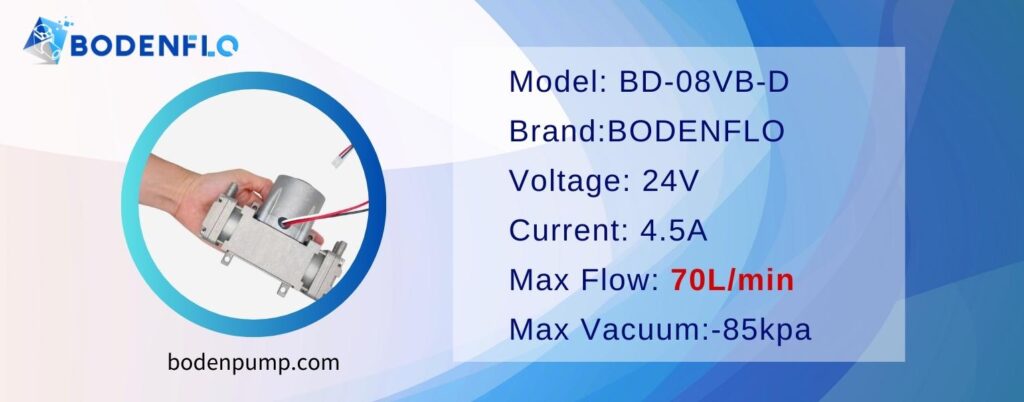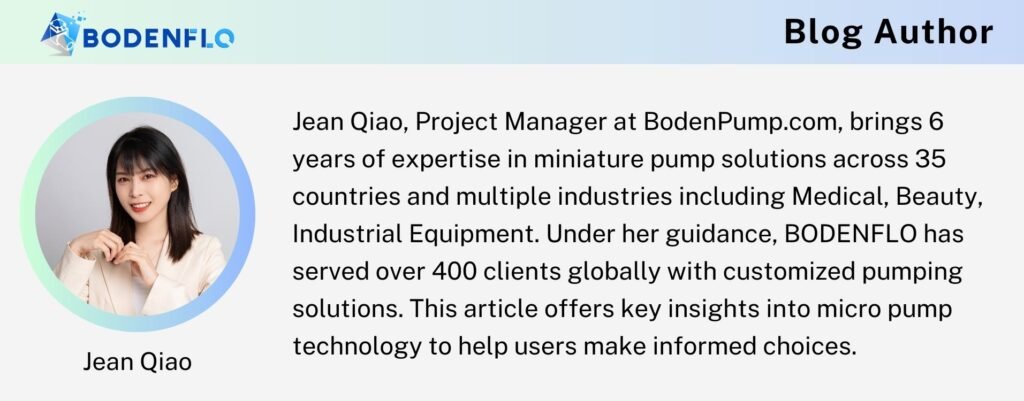
Selecting a miniature pump might seem straightforward, but the nuances are often missed. Are you aware of the pitfalls, the technical aspects, or the quality parameters that can make or break your application?
To make an informed decision when choosing a miniature pump, you should consider multiple factors such as application requirements, material compatibility, flow rate, pressure, and even manufacturer credibility.
Now, if you're curious about diving deeper into these details, keep reading. I will guide you through the maze of miniature pump selection.
Understanding Application Requirements for Selecting Miniature Pumps
Objectives and Primary Use of the Pump
In the realm of miniature pumps, application specificity is critical. Clearly define the pump's role within the system. Is it for dosing, sampling, or circulation, pressurization, lifting, suction? The operational environment also matters.
Knowing the primary use enables you to narrow down the options. At BODENFLO, we offer application-specific customization, ensuring your pump meets the precise requirements of its role.
Critical Performance Parameters: Flow Rate and Pressure
Your pump must meet critical performance parameters. The two key ones are flow rate and pressure. Flow rate is the speed at which the pump can move fluid, typically measured in liters per minute (L/min). It determines the efficiency of your system. A pump with an incompatible flow rate could cause system underperformance.
Pressure, expressed in pounds per square inch (PSI), relates to the pump's ability to perform against resistance. For instance, pumps for medical equipment often require higher pressure levels due to the complexity of the systems they integrate with.
Both flow rate and pressure should align with the pump's intended application. Misalignment here could lead to inefficiencies, increased wear, and a potential breakdown of components. BODENFLO's range of miniature pumps can be configured to specific flow rates and pressure requirements, offering versatile solutions for diverse applications.
Technical Specifications and Compatibility for Miniature Pumps
Fluid Handling Capabilities
When you're in the miniature pump business like we are at BODENFLO, you quickly realize that not every pump can handle every type of fluid. Fluid viscosity and chemical compatibility are critical factors that dictate your pump selection. Some pumps are well-suited for handling corrosive chemicals, while others are designed for neutral or aqueous solutions.
It's paramount to understand the types of fluids your application will encounter. This information directly impacts pump longevity and performance. Neglecting to consider fluid types could lead to pump failure and costly downtime.
Material Selection for Corrosion Resistance
Another cornerstone consideration is the material of the pump. Pumps made of materials like stainless steel or PTFE (Polytetrafluoroethylene) offer high corrosion resistance.
You'll need to consider the environment where your pump will operate. Is it susceptible to corrosive elements? This not only applies to the fluid being pumped but also to the external operating environment. With BODENFLO's wide array of material options, you can choose the optimal one for your specific needs.
Size and Dimensional Requirements
The footprint of your pump matters, especially when integrating it into complex systems or tight spaces. Dimensions dictate how seamlessly a pump can fit into an existing setup.
Be sure to acquire precise measurements for the available space for pump installation. Incorrect dimensions could lead to integration issues, requiring a complete system reconfiguration. This is where our customization services at BODENFLO come into play, as we offer pumps that can be tailored to fit unique size and dimensional requirements.
Efficiency and Reliability Metrics for Miniature Pumps
Operational Efficiency vs. Energy Consumption
At BODENFLO, we're constantly striving to deliver pumps that give you the most bang for your buck. But how do you measure operational efficiency? It's not just about the pump's output; it's also about how much energy it consumes to achieve that output.
Consider the power-to-flow rate ratio. The ideal pump will have a high flow rate while consuming minimal energy. A pump that uses less energy for the same or greater flow rate is generally more efficient and will result in long-term cost savings. Always consult the manufacturer's data sheets for specific efficiency metrics.
Reliability and Longevity Assessments
It's a simple fact: downtime is costly. That's why, at BODENFLO, we prioritize reliability as a key performance indicator. When selecting a miniature pump, scrutinize the MTBF (Mean Time Between Failures) data.
The longer the MTBF, the less frequently you'll face maintenance issues or outright failures. This directly translates to less downtime and more operational efficiency. It's also advisable to look for pumps with warranties and to inquire about the availability of replacement parts. This future-proofs your investment, adding an additional layer of reliability.
Budget and Economic Viability: Micro Pumps as the Heart of Fluidic and Pneumatic Modules in Sophisticated Systems
Initial Capital Expense vs. Operational Costs
In advanced machinery, devices, and comprehensive systems, micro pumps play an indispensable role. They function as the heart of fluidic and pneumatic modules, enabling exact control, trustworthy performance, and optimal operational efficiency. Given this crucial role, the initial capital expense of the pump should not be evaluated in isolation. Instead, it's an integrated part of your investment in a larger, sophisticated system. The initial cost must be balanced against the operational efficiencies and performance metrics that these micro pumps deliver.

At BODENFLO, we specialize in these mission-critical micro pumps. We assist our clients in making economically sound decisions that reflect both the upfront costs and the longer-term operational expenditures. The focus is always on delivering a pump that aligns with your specific needs and contributes to the overall efficiency of your system.
Total Cost of Ownership, including Maintenance
Furthermore, one must consider the Total Cost of Ownership (TCO) which includes not just the initial capital but also long-term maintenance costs. Because these pumps serve as the heart of sophisticated systems, a failure or inefficiency in the pump could lead to disruptions in the entire system, escalating the real TCO.
Considering maintenance, it isn't just a line item in the budget; it's an essential component that influences the reliability and longevity of your entire equipment or system. Maintenance costs are thus intrinsically tied to the pump's role in ensuring precise control and operational efficiency.
Regulatory Compliance and Safety: Meeting the Highest Standards for Micro Pumps in Sophisticated Systems
Certifications and Industry Standards
In an increasingly regulated environment, it's not enough for a micro pump to merely perform well; it must also meet various industry standards and certifications. Complying with regulations such as CE, RoHS, and ISO can be essential depending on your application and geography. These certifications attest to the quality, safety, and environmental impact of the product.
At BODENFLO, we prioritize compliance as much as we do performance. Our micro pumps are manufactured to meet or exceed industry standards, ensuring they can be integrated into systems that are both high-performing and compliant with the relevant regulatory framework.
Safety Features and Fail-Safes
Beyond standard compliance, safety cannot be compromised. Micro air pumps, miniature vacuum pump, micro liquid pumps often serve critical roles in medical devices, environmental systems, and industrial applications. Any failure could lead to devastating outcomes. Hence, built-in safety features and fail-safes are not optional; they are integral parts of a reliable pump. Features like thermal overload protection, dry-running capabilities, and chemical-resistant materials are worth considering.
In our product line, safety is a non-negotiable criterion. We incorporate multiple layers of safety features and fail-safes to mitigate risks. This allows you to focus on the broader system knowing that the pump, its safety features, and the associated compliance standards are in alignment with your operational needs and regulatory demands.
Manufacturer Credentials and Support: A Cornerstone for a Successful Long-term Partnership
Manufacturer's Reputation and Credibility
The reputation of a manufacturer holds immense weight in any purchasing decision, especially when the component—such as a micro pump—is central to the functioning of a larger system. Reviews, case studies, and customer testimonials provide valuable insights into the manufacturer's credibility.

At BODENFLO, we have built a reputation grounded in quality, innovation, and customer satisfaction. Our global footprint across Europe, the United States, and Asia, serves as a testament to our commitment to excellence. As you consider partnering with a micro pump manufacturer, let our track record assure you that our products and services meet the highest industry standards.
After-sales Support and Warranty Terms
A quality product is only as good as the support that comes with it. After-sales service, including prompt customer support and robust warranty terms, is crucial. These factors ensure that any disruptions to your operations are minimized, both in terms of time and resources.
Future-Proofing and Scalability: Preparing for Tomorrow, Today
Upgradability and Compatibility with Future Tech
In the ever-evolving landscape of technology, future-proofing your systems is not a luxury; it's a necessity. The micro pump you invest in today should not become obsolete tomorrow. As the core of fluidic and pneumatic modules in sophisticated systems, micro pumps should be capable of adapting to future technological advancements.
At BODENFLO, we design our micro pumps with upgradability in mind. Our pumps are built to be compatible with future technologies, ensuring you don't need a complete overhaul as advancements occur. This not only makes economic sense but also safeguards the longevity and adaptability of your larger systems.
Environmental Impact and Sustainability
The environmental footprint of your operations is no longer a side concern; it's a primary criterion for both regulatory compliance and corporate responsibility. A sustainable, energy-efficient micro pump can substantially reduce your environmental impact while also providing cost savings in long-term energy consumption.

We at BODENFLO are committed to sustainability. Our micro pumps like BD-08 Series are designed with energy-efficient operation and eco-friendly materials, aligning with global sustainability goals. Not only does this add to your company's corporate social responsibility profile, but it also prepares you for future environmental regulations that are increasingly becoming stricter.
Conclusion
Choosing a miniature pump is not just about the price or size; it's a multi-faceted decision that demands careful consideration. Factors like material compatibility, flow rate, pressure, and the credibility of the manufacturer can't be overlooked. Take your time and choose wisely.
Selecting the right micro pump for your application involves a blend of several key factors—from understanding your specific needs to assessing performance parameters, reliability, and the economic viability of your investment. At BODENFLO, we bring industry-leading expertise and cutting-edge technology to tailor solutions that meet your unique challenges. Take the guesswork out of the selection process; consult with our specialized team to find a micro pump that is customizable, high-performing, and future-proof. Let's collaborate to make your next project a resounding success. Contact us today to get started.


